by
Mark Mallett
Note: To read Part 1 of my response to Jimmy Akin, see here.
Apologist Jimmy Akin of Catholic Answers has continued his critique of the apostolate of Countdown to the Kingdom with a second article now.
First, I wish to reiterate my sentiment at the bottom of my last response to Mr. Akin that, “as the Catholic world is shrinking… unity in the Body of Christ is more threatened than ever.” This is to say that, while one may personally hold certain criticisms and opinions of another apostolate, to take them to the public forum — without proper documentation and understanding or mutual consultation — creates potential confusion and division in the Body of Christ. As the Catechism of the Catholic Church states:
To avoid rash judgment, everyone should be careful to interpret insofar as possible his neighbor’s thoughts, words, and deeds in a favorable way:
- Every good Christian ought to be more ready to give a favorable interpretation to another’s statement than to condemn it. But if he cannot do so, let him ask how the other understands it. And if the latter understands it badly, let the former correct him with love. If that does not suffice, let the Christian try all suitable ways to bring the other to a correct interpretation so that he may be saved. —Catechism of the Catholic Church, n. 2478
Unfortunately, Mr. Akin has abandoned this approach (he has not reached out to me or my team for further clarification and discussion), and it shows. In summary:
- Mr. Akin continues to question how reliable the discernment process is at Countdown by suggesting that ‘Church approval’ is the standard we must use. But the Church herself does not teach that.
- He asserts that the Early Church Fathers who taught of a coming temporal kingdom and period of spiritual blessings were in error (millenarianism). More careful and recent scholarship, however, affirms the Church Fathers’ expectations.
- Mr. Akin considers over a century of papal teaching affirming a coming “period of peace” and sanctity to be mere “speculation.” However, the Catechism affirms that the ordinary Magisterium of the Church does not demand ex cathedra language.
- He provides two examples where he claims we have taken popes out of context. On the contrary, his two examples affirm papal teaching and Scripture.
- Mr. Akin insists Fatima is a thing of the past. Benedict XVI disagrees.
- He suggests that Countdown is in violation of a decree on Luisa Piccarreta’s writings and that Fr. Michel Rodrigue, one of the seers we are discerning on this site, is deluded or a liar. We have something to say of this shameful attack on this Abbot’s character.
On the credibility of our discernment process
Mr. Akin states:
I nowhere implied that a seer’s lack of Church approval means the seer is unreliable. Instead, I wrote: “Countdown has chosen not to use Church approval as the standard for deeming seers credible. How reliable is its own evaluation?”
This statement appears contradictory. If a seer can still be reliable without Church approval, as Mr. Akin implies, why then is he suggesting that “Church approval” must be the only standard by which we evaluate the reliability of private revelation? He appears to be attempting to subtly throw shade on any seer who does not have an official declaration of “approval” — even though such approval is rare while seers are still receiving and giving revelations. Obviously, ecclesiastical status, then, is only one of several considerations when it comes to discerning seers and not even the standard demanded by the Church herself. Moreover, the type of approval Mr. Akin has in mind — a Vatican-issued “constat de supernaturalitate” — is virtually never given to any seer. Not even St. Faustina’s revelations received such a decree. Clearly, therefore, limiting our consideration of private revelation to only those which bear approvals of that sort is utterly uncalled for and frankly ridiculous to imply as being necessary.
Since the abolition of Canon 1399 and 2318 of the former Code of Canon Law by Pope Paul VI in AAS 58 (1966), publications about new apparitions, revelations, prophecies, miracles, etc. have been allowed to be distributed and read by the faithful without the express permission of the Church, provided they contain nothing which contravenes faith and morals. This means that even an Imprimatur is not necessary. Therefore, every message on Countdown to the Kingdom (CTTK) must first pass the litmus test of orthodoxy. To suggest in any way, then, that private revelation should be “approved” in order to be read or discerned, or even believed, is misleading.
One gets the impression that Mr. Akin believes we publish every claim to private revelation that crosses our desks. Indeed, we do receive letters from people claiming to have received private revelation. However, nearly all of these do not appear on CTTK. The reason is that there is frequently no way to substantiate the credibility of such claims. St. John of the Cross warned against the possibility of self-delusion:
I am appalled at what happens in these days—namely, when some soul with the very smallest experience of meditation, if it be conscious of certain locutions of this kind in some state of recollection, at once christens them all as coming from God, and assumes that this is the case, saying: “God said to me…”; “God answered me…”; whereas it is not so at all, but, as we have said, it is, for the most part, they who are saying these things to themselves. And, over and above this, the desire which people have for locutions, and the pleasure which comes to their spirits from them, lead them to make answer to themselves and then to think that it is God Who is answering them and speaking to them. —St. John of the Cross, The Ascent of Mount Carmel, Book 2, Chapter 29, n.4-5
Which is why accompanying supernatural phenomena like stigmata, miracles, lacrimation of icons and statues, conversions, etc. are considered by the Church as possible further proof of claims to the supernatural origin of said revelations. The Sacred Congregation for the Doctrine of the Faith refutes the notion that the fruits are irrelevant. It specifically refers to the importance when such revelations…
A private revelation can be safely believed after careful discernment without Church approval. The seers of Fatima, for example, were discerned to be very “reliable” without Church approval (which took some 13 years after the famous “miracle of the sun”). St. Pio, St. Faustina, Servant of God Luisa Piccarreta, etc. are all examples of mystics who imparted revelations that were believed based on existing and substantial evidence. Faith and reason are not opposed; ie. reason, enlightened by faith, can bring us to proper discernment. While Mr. Akin states, “a lack of careful reading and evaluation is common on Countdown”, he seems to have not carefully read my initial response, which included the words of Benedict XIV on whether or not “Church approval” is the only reliable standard to evaluate prophecy:
Are they to whom a revelation is made, and who are certain it comes from God, bound to give a firm assent thereto? The answer is in the affirmative… He to whom that private revelation is proposed and announced, ought to believe and obey the command or message of God, if it be proposed to him on sufficient evidence… For God speaks to him, at least by means of another, and therefore requires him to believe; hence it is, that he is bound to believe God, Who requires him to do so. —Heroic Virtue, Vol III, p.390, p. 394
Finally, it needs to be repeated: by publishing the messages of certain seers on CTTK, we are not making a declaration on their authenticity but proposing them precisely for discernment by the entire Church. Again, if Mr. Akin would have carefully read and evaluated the content on our website, he would have found on our homepage a Disclaimer, which states:
We are not the final arbiters of what constitutes an authentic revelation—the Church is—and we will always submit to whatever she definitively decides. It is with the Church, then, that we “test” prophecy: “Guided by the Magisterium of the Church, the sensus fidelium knows how to discern and welcome in these revelations whatever constitutes an authentic call of Christ or his saints to the Church.” (Catechism of the Catholic Church, n. 67)
That says “guided” not “decided” by the Magisterium.
On the Church Fathers
Mr. Akin states:
It is surprising [Mark Mallett] cites the Fathers’ understanding of the millennium, for the Fathers famously disagree on this. In support of Countdown’s understanding, Mr. Mallett cites early sources such as the Letter of Barnabas, Papias, Justin Martyr, Irenaeus, and Tertullian on the millennium. Yet he fails to mention that patristics scholars recognize each of these sources as supporting millenarianism — the view that there will be a physical resurrection of the righteous, after which they will reign with Christ on earth for a lengthy period before the final judgment (both the Church and Countdown reject millenarianism).
Here, Mr. Akin also appears selective, failing to cite the outstanding work of patristic scholar Rev. Joseph Iannuzzi Ph.B., STB, M. Div., STL, STD, who has devoted a great deal of his life and writings to developing the theology of the millennium and the coming Era of Peace; Dr. Françoise Breynaert, The Glorious Coming of Christ & the Millennium (2019); and Professor Jacques Cabaud, On the End Times (2019).
In examining the triumphant renewal of Christianity, many authors have assumed a scholastic style, and have cast shadows of doubt on the early writings of the Apostolic Fathers. Many have come close to labeling them as heretics, mistakenly comparing their “unmodified” doctrines on the millennium to those of the heretical sects. —Fr. Joseph Iannuzzi, The Triumph of God’s Kingdom in the Millennium and End Times: A Proper Belief from the Truth in Scripture and Church Teachings, St. John the Evangelist Press, 1999, p. 11
I have also written a book on this subject called The Final Confrontation, which received the Nihil Obstat. Professor Daniel O’Connor (who is an advisor to CTTK) has also presented an exhaustive defence of the Church Fathers and the Era of Peace in numerous works such as The Crown of Sanctity and his latest book, Thy Will be Done. Moreover, the translator of this website’s messages, Peter Bannister, MTh, MPhil, is well-versed in the patristic writings on the millennium and their echo in modern prophecy. Therefore, we cordially disagree with Mr. Akin’s impression that “a lack of careful reading and evaluation is common on Countdown” and that we have failed to consider that some of the Church Fathers disagreed among themselves (I have actually specifically addressed this here, an article I would have readily shared with Mr. Akin had he asked).
One has to pause and consider that some of the Church Fathers,[1]“…towering intellects of the early centuries of the Church, whose writings, sermons and holy lives influenced dramatically the definition, defence and propagation of the Faith”, Catholic Encyclopedia, Sunday Visitor Publications, 1991, p. 399. St. Vincent of Lerins wrote: “…if some new question should arise on which no such decision has been given, they should then have recourse to the opinions of the holy Fathers, of those at least, who, each in his own time and place, remaining in the unity of communion and of the faith, were accepted as approved masters; and whatsoever these may be found to have held, with one mind and with one consent, this ought to be accounted the true and Catholic doctrine of the Church, without any doubt or scruple.” —Commonitory of 434 A.D., “For the Antiquity and Universality of the Catholic Faith Against the Profane Novelties of All Heresies”, Ch. 29, n. 77 such as Papias, received their understanding of the millennium precisely from first-hand teaching of St. John himself. To outright dismiss this as heresy, as Mr. Akin suggests, is astonishing in itself, even if there are seeming whiffs of millenarianism in the Church Fathers’ writings.
Indeed, the misappropriation of Papias’ doctrines to certain Jewish-Christian heresies of the past emerges precisely from such faulty opinion. Some theologians inadvertently adopted Eusebius’ speculative approach… Subsequently, these ideologues associated everything and anything that borders on a millennium with Chiliasm, resulting in an unhealed breach in the field of eschatology that would remain for a time, like an ubiquitous stricture, attached to the salient word millennium. —Fr. Joseph Iannuzzi, The Triumph of God’s Kingdom in the Millennium and End Times: A Proper Belief from the Truth in Scripture and Church Teachings, St. John the Evangelist Press, 1999, p. 20
Unfortunately, Mr. Akin does not make a clear distinction of what precisely constitutes the heresy of millenarianism. The Catechism of the Catholic Church states:
The Antichrist’s deception already begins to take shape in the world every time the claim is made to realize within history that messianic hope which can only be realized beyond history through the eschatological judgment. The Church has rejected even modified forms of this falsification of the kingdom to come under the name of millenarianism, (577) especially the “intrinsically perverse” political form of a secular messianism. (578) —n. 676
I deliberately left in the footnote references above because they are crucial in helping us understand what is meant by “millenarianism”, and secondly, “secular messianism” in the Catechism.
Footnote 577 is a reference to Denzinger-Schonnmetzer’s work (Enchiridion Symbolorum, definitionum et declarationum de rebus fidei et morum). Denzinger’s work traces the development of doctrine and Dogma in the Catholic Church from its earliest times, and is obviously seen as a credible enough source for the Catechism to quote. The footnote to “millenarianism” leads us to Denzinger’s work, which states:
…the system of mitigated Millenarianism, which teaches, for example, that Christ the Lord before the final judgment, whether or not preceded by the resurrection of the many just, will come visibly to rule over this world. The answer is: The system of mitigated Millenarianism cannot be taught safely. —DS 2269/3839, Decree of the Holy Office, July 21, 1944
Whenever the Church Fathers speak of a Sabbath rest or era of peace, they do not foretell a return of Jesus in the flesh, nor the end of human history, rather they accentuate the Holy Spirit’s transforming power in the sacraments that perfects the Church, so that Christ may present her to himself as an immaculate bride upon his final return. —Rev. J. L. Iannuzzi, The Splendor of Creation, p. 79
Two things to note here: the Church does not dismiss the possibility of some kind of “resurrection of the just”, which has precedent in Christ’s own Resurrection narrative.[2]see The Coming Resurrection and The Resurrection of the Church
The essential affirmation is of an intermediate stage in which the risen saints are still on earth and have not yet entered their final stage, for this is one of the aspects of the mystery of the last days which has yet to be revealed. —Cardinal Jean Daniélou (1905-1974), A History of Early Christian Doctrine Before the Council of Nicea, 1964, p. 377
Second, Millenarianism, writes Leo J. Trese in The Faith Explained, pertains to those who take Revelation 20:6 literally.
St. John, describing a prophetic vision (Rev 20:1-6), says that the devil will be bound and imprisoned for a thousand years, during which the dead will come to life and reign with Christ; at the end of the thousand years the devil will be released and finally vanquished forever, and then will come the second resurrection… Those who do take this passage literally and believe that Jesus will come to reign upon earth for a thousand years before the end of the world are called millenarists. —p. 153-154, Sinag-Tala Publishers, Inc. (with the Nihil Obstat and Imprimatur)
Cardinal Jean Daniélou summarizes:
Millenarianism, the belief that there will be an earthly reign of the Messiah before the end of time, is the Jewish-Christian doctrine which has aroused and continues to arouse more argument than any other. —A History of Early Christian Doctrine, p. 377 (as cited in The Splendor of Creation, p. 198-199, Rev. Joseph Iannuzzi)
He adds, “The reason for this, however, is probably a failure to distinguish between the various elements of doctrine.”[3]“One should not equate spiritual millenarianism with the “spiritual blessings” of the era of peace contained in the writings of the early Fathers and Doctors. Tradition has upheld the spiritual interpretation of the era of peace. Conversely, spiritual millenarianism promotes the idea that Christ will return to earth before the General Judgment and visibly reign for literally 1,000 years. He would not, however, participate in immoderate carnal banquets. Hence the name spiritual.” —Iannuzzi, Rev. Joseph. The Splendor of Creation: The Triumph of the Divine Will on Earth and the Era of Peace in the Writings of the Church Fathers, Doctors and Mystics, Kindle Edition.
The Catechism’s footnote 578, as cited above, brings us to the document Divini Redemptoris, Pope Pius XI’s Encyclical against Atheistic Communism. While the millenarians held to some form of a utopian quasi-spiritual kingdom, secular messianists hold to a utopian political kingdom.
The Communism of today, more emphatically than similar movements in the past, conceals in itself a false messianic idea. —POPE PIUS XI, Divini Redemptoris, n. 8, www.vatican.va
(As a side note, I would encourage Mr. Akin to consider that it is “The Great Reset” — and not the teaching of an Era of Peace — that constitutes the real threat to the Catholic faithful, indeed, the whole of humanity. It is virtually Communism “with a green hat.”)
In conclusion, does the Church condemn the prospect of an Era of Peace during the so-called “thousand years” of Revelation 20? When Padre Martino Penasa spoke to Msgr. S. Garofalo (Consultant to the Congregation for the Cause of Saints) on the scriptural foundation of a historic and universal Era of Peace, as opposed to millenarianism, Msgr. suggested that the matter be posed directly to the Congregation for the Doctrine of the Faith. Fr. Martino thus posed the question: “È imminente una nuova era di vita cristiana?” (“Is a new era of Christian life imminent?”). The Prefect at that time, Cardinal Joseph Ratzinger replied, “La questione è ancora aperta alla libera discussione, giacchè la Santa Sede non si è ancora pronunciata in modo definitivo”:
The question is still open to free discussion, as the Holy See has not made any definitive pronouncement in this regard. —Il Segno del Soprannauturale, Udine, Italia, n. 30, p. 10, Ott. 1990; Fr. Martino Penasa presented this question of a “millenary reign” to Cardinal Ratzinger
On the Magisterium
Mr. Akin alleges:
Concerning the Magisterium, there is no easy way to say this, but the authors of Countdown do not appear to have a clear understanding of what constitutes a magisterial act or a Church teaching.
Unfortunately, Mr. Akin was not careful to read the distinctions I made, nor do I subscribe to his interpretation of what constitutes “magisterial” teaching. When I quoted bishops, cardinals, and popes, I did so as magisterial teachings. When I cited Fr. Charles and St. Louis de Montfort, I was careful to denote that they are “ecclesiastical teaching” — ie. coming from clergy. However, Mr. Akin somewhat shockingly dismisses over a century of papal teachings in high-level magisterial documents that clearly speak of the Era of Peace, by calling them mere “speculation.” We argue that based on the Scriptures, testimony of the Church Fathers, numerous magisterial documents, and confirmations in prophetic revelation, the bishops, cardinals and popes who affirm this expectation are “exercising the ordinary Magisterium”. The Catechism of the Catholic Church states:
Divine assistance is also given to the successors of the apostles, teaching in communion with the successor of Peter, and, in a particular way, to the bishop of Rome, pastor of the whole Church, when, without arriving at an infallible definition and without pronouncing in a “definitive manner,” they propose in the exercise of the ordinary Magisterium a teaching that leads to better understanding of Revelation in matters of faith and morals. —n. 892
Rev. Iannuzzi argues:
Many early Church Fathers, Doctors and mystics have consistently foretold an era of peace and great Christian holiness, thereby giving evidence to support the position that this teaching is part and parcel of the Church’s Tradition. —The Splendor of Creation: The Triumph of the Divine Will on Earth and the Era of Peace in the Writings of the Church Fathers, Doctors and Mystics, loc. 4747, Kindle Edition
We are frankly astonished at the glibness with which Mr. Akins treats this papal consensus reaffirming the Church’s Tradition on a coming period of triumphant sanctity. The mere fact that ex-cathedra language was not used within these Encyclicals, etc. to speak of the Era of Peace does not imply that the Era is not magisterially taught.
In terms of further magisterial sources, The Teachings of the Catholic Church, published by a theological commission in 1952, concluded that it is not contrary to Catholic teaching to believe or profess…
…a hope in some mighty triumph of Christ here on earth before the final consummation of all things. Such an occurrence is not excluded, is not impossible, it is not all certain that there will not be a prolonged period of triumphant Christianity before the end.
Steering clear of millenarianism, they rightly conclude:
If before that final end there is to be a period, more or less prolonged, of triumphant sanctity, such a result will be brought about not by the apparition of the person of Christ in Majesty but by the operation of those powers of sanctification which are now at work, the Holy Ghost and the Sacraments of the Church. —The Teaching of the Catholic Church: A Summary of Catholic Doctrine (London: Burns Oates & Washbourne, 1952), p. 1140
Out of context?
Mr. Akin claims:
Countdown takes statements out of context to make them fit the timeline’s future scenario. When Benedict XV speculated in 1914 about wars arising in his day, he was talking about World War I, which had started a few months before. And when Pius XII speculated in 1944 about a hoped-for new era beginning, he was talking about the end of World War II, which concluded in Europe a few months later.
Arguably, it is Mr. Akin who has taken Pius XII out of the context of former papal statements, notably the predecessor whose very namesake he claimed. Several decades before World War II, Pope St. Pius X was already declaring in an Encyclical (which are papal letters that “shed light on existing doctrine as part of the Holy Father’s ordinary teaching authority”[4]library.athenaeum.edu ) on the coming “restoration of all things in Christ.”[5]E Supremi, October 4th, 1903 That Pope Pius XII then hoped for the “renovation, the complete reorganization of the world” is arguably a continuation of St. Pius X’s thought — and more urgently, no doubt.
Some will certainly be found who, measuring Divine things by human standards will seek to discover secret aims of Ours, distorting them to an earthly scope and to partisan designs. —POPE ST. PIUS X, E Supremi, n. 4
As for Benedict XV, indeed he was clearly surmising, along with previous popes, that the global unrest and revolutions were a sign that the Gospel prophecies were beginning to unfold:
Certainly, those days would seem to have come upon us of which Christ Our Lord foretold: “You shall hear of wars and rumours of wars—for nation shall rise against nation, and kingdom against kingdom“ (Matt 24:6-7). —POPE BENEDICT XV, Ad Beatissimi Apostolorum, November 1, 1914
The keyword here is “beginning.” Indeed, Our Lord spoke of these wars as “labor” pains, not the birth itself.
All these are the beginning of the labor pains. (Matthew 24:8)
Fatima fulfilled?
Mr. Akin continues to insist that Fatima is now a historical lesson of the past, citing the theological commentary of Cardinal Joseph Ratzinger. However, even this commentary, and future statements by the same prelate when he became pope, definitively indicate that the “mission” of Fatima is not complete and still has a future context. From the commentary:
The angel with the flaming sword on the left of the Mother of God recalls similar images in the Book of Revelation. This represents the threat of judgement which looms over the world. Today the prospect that the world might be reduced to ashes by a sea of fire no longer seems pure fantasy: man himself, with his inventions, has forged the flaming sword… The purpose of the vision is not to show a film of an irrevocably fixed future. —vatican.va
In other words, our response to the message of Fatima will still determine the future. Hence, Pope Benedict later affirms that Fatima is not a message of the past:
…we would be mistaken to think that the prophetic mission of Fatima is complete. —Homily, May 13th, 2010, Fatima, Portugal; Catholic News Agency
I’m not sure what is not clear to Mr. Akin at this point. For example, the “period of peace” promised by Our Lady of Fatima has not arrived.[6]cf. Did the Period of Peace Already Happen? Otherwise, why did Pope Benedict pray for this Triumph?
May the seven years which separate us from the centenary of the apparitions hasten the fulfillment of the prophecy of the triumph of the Immaculate Heart of May, to the glory of the Most Holy Trinity. —POPE BENEDICT XVI, May 13th, 2010, Catholic News Agency
What prophecy?
In the end, my Immaculate Heart will triumph. The Holy Father will consecrate Russia to me, and she shall be converted, and a period of peace will be granted to the world. —Our Lady to visionary Sr. Lucia; a letter to the Holy Father, May 12th, 1982; The Message of Fatima, vatican.va
Yes, a miracle was promised at Fatima, the greatest miracle in the history of the world, second only to the Resurrection. And that miracle will be an era of peace, which has never really been granted before to the world. —Cardinal Mario Luigi Ciappi, papal theologian for Pius XII, John XXIII, Paul VI, John Paul I, and John Paul II, October 9th, 1994, The Apostolate’s Family Catechism, p. 35
The Seers
I have already answered much of Mr. Akin’s assertion that we lack “critical thinking” when it comes to the seers, in the first section above. Sadly, there seems to be no lack of rash judgment on Mr. Akin’s part – a man who is not part of the day-to-day workings, dialogues, and discernment that takes place under the wings of the Church’s teaching and guidelines.
On the late Fr. Stefano Gobbi, we did not include the seeming prophetic “miss” regarding his prophecies focused on the year 2000 for reasons that the messages themselves explain — and similar to what Benedict XVI was driving at in his commentary on Fatima:
…the design of God’s Justice, can still be changed by the power of His merciful Love. Even when I foretell punishment to you, remember that everything can be changed in a moment by the power of your prayer and of your penance, which makes reparation. So do not say “What you foretold to us did not come true!”, but thank the Heavenly Father with me because, through the response of prayer and consecration, through your suffering, through the immense suffering of so many of my poor children, He has again put off the time of Justice, to allow the time of great Mercy to flower. —January 21st, 1984; To the Priests, Our Lady’s Beloved Sons
I agree that we should probably add this to his biography for the skeptics — but it wasn’t omitted on purpose.
On Servant of God Luisa Piccarreta, Mr. Akin states that Countdown “makes no mention of her bishop’s decree, which is still in force and states:”
I must mention the growing and unchecked flood of transcriptions, translations and publications both through print and the internet. At any rate, “seeing the delicacy of the current phase of the proceedings, any and every publication of the writings is absolutely forbidden at this time. Anyone who acts against this is disobedient and greatly harms the cause of the Servant of God (emphasis in original). [former Archbishop of Trani, Giovanni Battista Pichierri]
Countdown appears to violate this decree by publishing excerpts from her writings (e.g., here).
On the contrary, CTTK has not “published” the writings of the Servant of God Luisa Piccarreta. The diocesan decree Mr. Akin quotes only restricts the full publication of her volumes, not the quotation of excerpts. Within the very same decree that Mr. Akin quotes, the late bishop who authored it insisted that the writings of Luisa should be read and shared (see On the Writings of Luisa Piccarreta). The entire decree and relevant considerations can be found in the appendices of the free e-Book, The Crown of Sanctity by Prof. Daniel O’Connor.
On the alleged seer Fr. Michel Rodrigue, Mr. Akin states:
The worst case of Countdown’s lack of critical thinking is its promotion of Fr. Michel Rodrigue… this man is simply not credible.
Here, Mr. Akin has fallen into not only rash judgment but slander and hypocrisy. For he states in both his articles:
The [Countdown] website does not show evidence that the authors have conducted detailed investigations of the seers they recommend or, if they have, that they properly applied critical thinking to their cases and objectively weighed the evidence.
We would like to ask Mr. Akin if he has conducted a detailed investigation of Fr. Michel that corresponds to his conclusions? Has Mr. Akin contacted Fr. Michel to interview and question him regarding his testimony? Has Jimmy Akin attempted to contact anyone in Fr. Michel’s circle to verify his stories and life? And how does Mr. Akin know how I or anyone on our team personally feel about Fr. Michel’s claims and relevations, or any other seer on Countdown, as we continue to discern and test them? Why does Mr. Akin assume that there is no ongoing critique, questions, or reservations regarding Fr. Michel or any other seer? As far as I know, Mr. Akin has had no contact with Fr. Michel or our team to verify and dig deeper. Instead, he concludes that “Fr. Rodrigue is not capable of separating fantasy from reality or that he is telling self-aggrandizing lies.” This is a sad moment to publicly level this accusation, without sufficient foundation, for anyone — much less one of the frontmen of Catholic Answers.
Is Fr. Michel a genuine mystic? For myself, that question remains neutral as I continue to test his prophecies and claims. But regarding his priesthood and orthodox teachings of the faith, there is no question that Fr. Michel has been a faithful servant. The letters we’ve received attesting to dramatic conversions through Fr. Michel’s retreats are enough for me to continue to discern and weigh the prophetic aspects — which Mr. Akin or anyone else are free to set aside. However, they are not free to set aside the teachings of the Catechism:
Respect for the reputation of persons forbids every attitude and word likely to cause them unjust injury. He becomes guilty:
– of rash judgment who, even tacitly, assumes as true, without sufficient foundation, the moral fault of a neighbor;
– of detraction who, without objectively valid reason, discloses another’s faults and failings to persons who did not know them;
– of calumny who, by remarks contrary to the truth, harms the reputation of others and gives occasion for false judgments concerning them. —n. 2477
Resources
On discerning prophecy with the Church: Prophecy in Perspective
On the Early Church Fathers and how the Era of Peace was misconstrued: How the Era was Lost
On Millenarianism – What it is, and is Not
On how an “eschatology of despair” has distorted the Church’s hopes: Rethinking the End Times
An Open Letter to the Holy Father on the Era of Peace: Dear Holy Father… He is Coming!
Pope Benedict on the expectation of Christ’s coming — before the Second Coming: The Middle Coming
Understanding the Triumph of the Immaculate Heart: The Triumph—Parts I-III
Pope John Paul II on The Coming New and Divine Holiness
The Crown of Sanctity — a defence of the Era of Peace and the Revelations of Jesus to the Servant of God Luisa Piccarreta — by Prof. Daniel O’Connor (or, for a much shorter version of the same material, see The Crown of History).
New book from Daniel O’Connor: Thy Will Be Done — The greatest petition of the Greatest Prayer—the Our Father—will not go unanswered. These words of Christ, “Thy Will be done on earth as it is in Heaven,” are the most exalted ones ever spoken; they chart the course of history and they define the mission of each Christian. From the teachings of Scripture and Saints, from Church Fathers and Doctors, from Mystics and Seers, from Magisterium and more—you will discover, within the pages of this book, how to engage in the Christian’s mission more powerfully than ever before, for the radical transformation of your life and the arrival of the World’s Penultimate Destiny.
The Splendor of Creation: The Triumph of the Divine Will on Earth and the Era of Peace in the Writings of the Church Fathers, Doctors and Mystics by Rev. Joseph Iannuzzi.
The Gift of Living in the Divine Will in the Writings of Luisa Piccarreta – An Inquiry into the early ecumenical councils, and patristic, scholastic and contemporary theology —Rev. Joseph Iannuzzi (with Ecclesiastical Approbation from The Pontifical Gregorian University of Rome, authorized by the Holy See)
Footnotes
| ↑1 | “…towering intellects of the early centuries of the Church, whose writings, sermons and holy lives influenced dramatically the definition, defence and propagation of the Faith”, Catholic Encyclopedia, Sunday Visitor Publications, 1991, p. 399. St. Vincent of Lerins wrote: “…if some new question should arise on which no such decision has been given, they should then have recourse to the opinions of the holy Fathers, of those at least, who, each in his own time and place, remaining in the unity of communion and of the faith, were accepted as approved masters; and whatsoever these may be found to have held, with one mind and with one consent, this ought to be accounted the true and Catholic doctrine of the Church, without any doubt or scruple.” —Commonitory of 434 A.D., “For the Antiquity and Universality of the Catholic Faith Against the Profane Novelties of All Heresies”, Ch. 29, n. 77 |
|---|---|
| ↑2 | see The Coming Resurrection and The Resurrection of the Church |
| ↑3 | “One should not equate spiritual millenarianism with the “spiritual blessings” of the era of peace contained in the writings of the early Fathers and Doctors. Tradition has upheld the spiritual interpretation of the era of peace. Conversely, spiritual millenarianism promotes the idea that Christ will return to earth before the General Judgment and visibly reign for literally 1,000 years. He would not, however, participate in immoderate carnal banquets. Hence the name spiritual.” —Iannuzzi, Rev. Joseph. The Splendor of Creation: The Triumph of the Divine Will on Earth and the Era of Peace in the Writings of the Church Fathers, Doctors and Mystics, Kindle Edition. |
| ↑4 | library.athenaeum.edu |
| ↑5 | E Supremi, October 4th, 1903 |
| ↑6 | cf. Did the Period of Peace Already Happen? |



 Alicja Lenczewska
Alicja Lenczewska

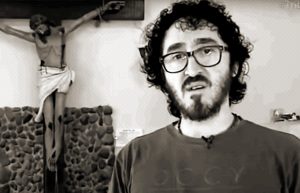
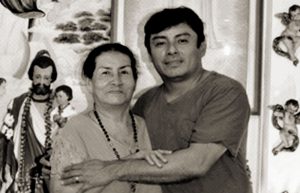
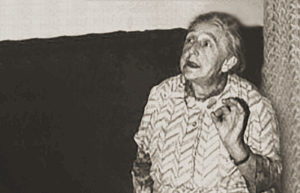 Elizabeth Kindelmann
Elizabeth Kindelmann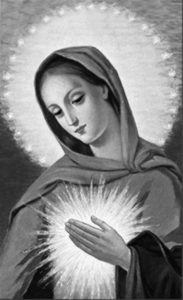 Through what became The Spiritual Diary, Jesus and Mary taught Elizabeth, and they continue to instruct the faithful in the divine art of suffering for the salvation of souls. Tasks are assigned for each day of the week, which involve prayer, fasting, and night vigils, with beautiful promises attached to them, laced with special graces for priests and the souls in purgatory. In their messages, Jesus and Mary say that The Flame of Love of the Immaculate Heart of Mary is the greatest grace given to mankind since the Incarnation. And in the not-so-distant future, her flame will engulf the entire world.
Through what became The Spiritual Diary, Jesus and Mary taught Elizabeth, and they continue to instruct the faithful in the divine art of suffering for the salvation of souls. Tasks are assigned for each day of the week, which involve prayer, fasting, and night vigils, with beautiful promises attached to them, laced with special graces for priests and the souls in purgatory. In their messages, Jesus and Mary say that The Flame of Love of the Immaculate Heart of Mary is the greatest grace given to mankind since the Incarnation. And in the not-so-distant future, her flame will engulf the entire world.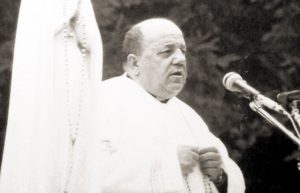 Father Stefano Gobbi
Father Stefano Gobbi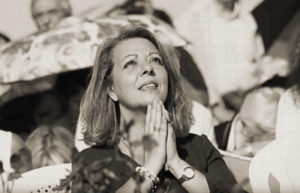 Why Gisella Cardia?
Why Gisella Cardia? Thirdly, the messages have frequently been accompanied by visible phenomena, photographic evidence found in In Cammino con Maria, which cannot be the fruit of subjective imagination, notably the presence of the stigmata on Giselle’s body and and the appearance of crosses or religious texts in blood on Gisella’s arms. See the pictures taken from her apparition website
Thirdly, the messages have frequently been accompanied by visible phenomena, photographic evidence found in In Cammino con Maria, which cannot be the fruit of subjective imagination, notably the presence of the stigmata on Giselle’s body and and the appearance of crosses or religious texts in blood on Gisella’s arms. See the pictures taken from her apparition website 
 Jennifer
Jennifer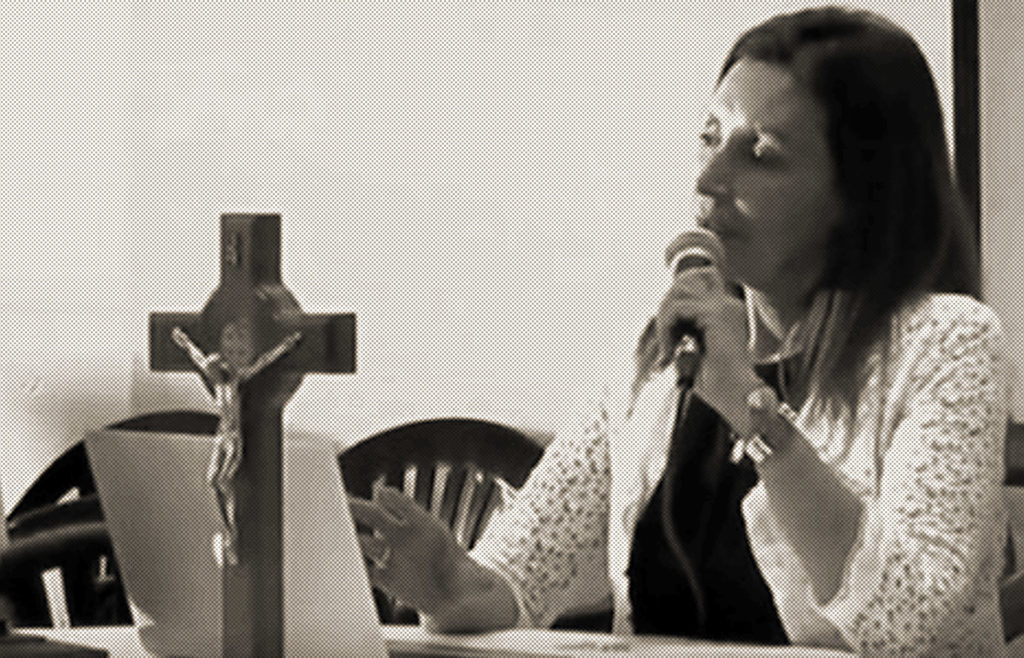
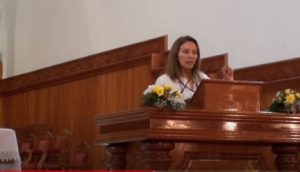
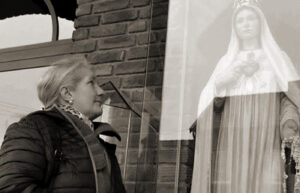 Why Manuela Strack?
Why Manuela Strack?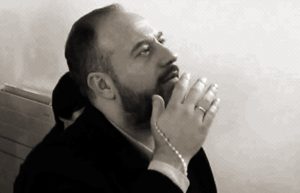

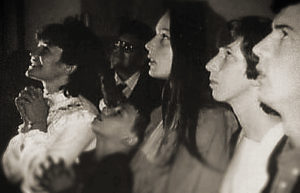 Why the Visionaries of Our Lady of Medjugorje?
Why the Visionaries of Our Lady of Medjugorje?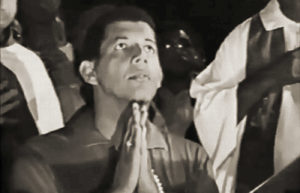 Why Pedro Regis?
Why Pedro Regis?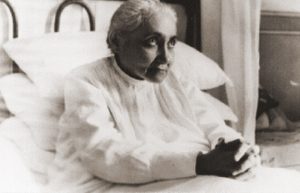 Why the Servant of God Luisa Piccarreta?
Why the Servant of God Luisa Piccarreta? of the saints. It wasn’t until she became a “Daughter of Mary” that the nightmares finally ceased at the age of eleven. In the following year, Jesus began to speak interiorly to her especially after receiving Holy Communion. When she was thirteen, He appeared to her in a vision that she witnessed from the balcony of her home. There, in the street below, she saw a crowd and armed soldiers leading three prisoners; she recognized Jesus as one of them. When He arrived beneath her balcony, He raised his head and cried out: “Soul, help Me!” Deeply moved, Luisa offered herself from that day on as a victim soul in expiation for the sins of mankind.
of the saints. It wasn’t until she became a “Daughter of Mary” that the nightmares finally ceased at the age of eleven. In the following year, Jesus began to speak interiorly to her especially after receiving Holy Communion. When she was thirteen, He appeared to her in a vision that she witnessed from the balcony of her home. There, in the street below, she saw a crowd and armed soldiers leading three prisoners; she recognized Jesus as one of them. When He arrived beneath her balcony, He raised his head and cried out: “Soul, help Me!” Deeply moved, Luisa offered herself from that day on as a victim soul in expiation for the sins of mankind. immobile, rigid-like state that appeared almost as if she were dead. It was only when a priest made the sign of the Cross over her body that Luisa regained her faculties. This remarkable mystical state persisted until her death in 1947—followed by a funeral that was no little affair. During that period in her life, she suffered no physical illness (until she succumbed to pneumonia at the end) and she never experienced bedsores, despite being confined to her little bed for sixty-four years.
immobile, rigid-like state that appeared almost as if she were dead. It was only when a priest made the sign of the Cross over her body that Luisa regained her faculties. This remarkable mystical state persisted until her death in 1947—followed by a funeral that was no little affair. During that period in her life, she suffered no physical illness (until she succumbed to pneumonia at the end) and she never experienced bedsores, despite being confined to her little bed for sixty-four years.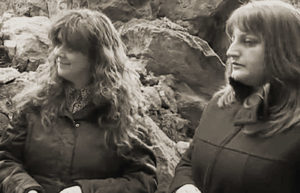 Why Simona and Angela?
Why Simona and Angela?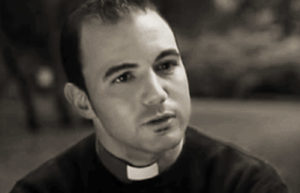
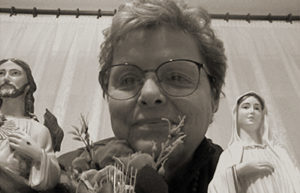 Valeria Copponi
Valeria Copponi